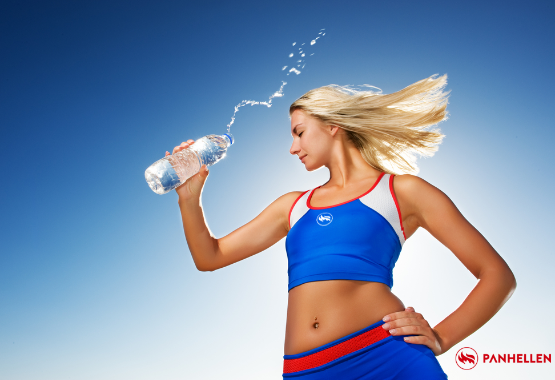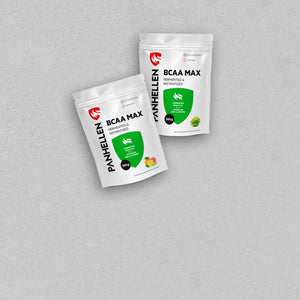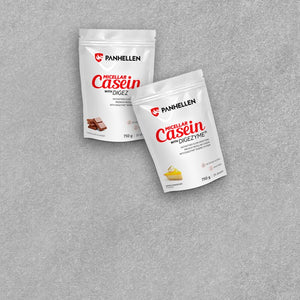IMPORTANCE OF FLUID REPLACEMENT IN SPORTS

50-70 percent of an adult's body, 80 percent of a newborn's body, and 95 percent of a fertilized egg are water. In the case of athletic, muscular people, the proportion of water is usually higher, because water makes up most of the muscle. Water is therefore an indispensable component of our body and life. Health is the most important ingredient of physiological functioning. It is no different in the case of athletes, in fact, the liquid; its composition and replacement play an even greater role in their lives.
The physiological role of water is very diverse: as a solvent, it helps transport nutrients; in its absorption; contributes to the selection of toxins and unnecessary substances that enter and are produced in the body; maintains blood volume; it provides a medium for the various chemical reactions taking place in the cell, but it also helps with temperature regulation.
WATER HOUSEHOLD
There are several sources of water for our body: fluid intake; the water content of food and the (so-called oxidation) water produced during various metabolic processes. Of course, we have the greatest influence on the first two. However, it is surprising how many ways water leaves our body. 300-500 ml in an average amount during breathing, approx. 100-300 ml with feces, 800-1200 ml with urine, with sweating on average approx. 300-600 ml is excreted every day. It can therefore be seen that, per day, approx. Our body needs 1.5-2 liters of clean water, and to this is added additional sweating and water loss due to increased temperature or physical activity. In case of illness (e.g. fever, diarrhoea), water loss also becomes significant.
HOW MUCH WATER DO WE LOSE?
The amount of sweat produced and the fluid released depends on several factors: the intensity of the training, the duration of the training, the external temperature and humidity, as well as individual characteristics (body composition, fitness level, etc.). During a 1-hour workout, an average person spends approx. You can expect 1 liter of fluid loss – more in warmer weather.
It is an experience that unfortunately most people only drink when they feel thirsty, even though the feeling of thirst is the body's emergency signal to prevent severe fluid loss. In addition, athletes must pay even more attention to replace the loss of the right amount and quality of fluid before feeling thirsty. Adequate fluid consumption and replacement largely determines sports performance!

DANGERS OF DEHYDRATION
Significant fluid loss has a negative impact on both performance and health.
The body reacts to a lack of water by defending itself; blood distribution is rearranged, there is a change in the conditions of (blood) circulation: the amount of blood decreases; the circulation of the muscles and skin decreases, which impairs performance and heat release, as well as burdens the heart, circulatory system and lungs. Symptoms of dehydration can be fatigue, headache, flushed skin, dark, strong-smelling urine, and rapid breathing. Unorganized fluid management for a long period of time can have more serious health consequences; the ability to concentrate deteriorates, muscle work decreases, muscle spasms and hallucinations, possibly fainting may occur.
FLUID REPLACEMENT IN PRACTICE
If the physical exercise does not exceed 50-60 minutes, water is a suitable choice for fluid replacement - but it should be added that it is not ideal in terms of performance enhancement . In case of longer-term, higher-intensity sports load, this quality is no longer enough. Sweat and urine are made up not only of water, but of various minerals and dissolved substances, so under the heading of fluid replacement, their replacement must also be solved. (Not to mention that for e.g. marathon runners, where the strain on the body is even greater, it is necessary to take care of nutrient replacement as well.) Fluid replacement is also necessary when the athlete does not feel thirsty, e.g. during swimming or winter sports.
"BETTER TO BE AFRAID THAN TO BE AFRAID!"
It is better to try to prevent dehydration than to experience the deterioration of performance, the symptoms and to resort to various remedies. Athletes drink fluids before, during and after training or competition lasting more than 50-60 minutes, as water loss can be several liters! Although we can calculate our water needs based on body weight, for athletes, actual water loss is more important than body weight. But basically it can be said that per 10 kg approx. A healthy person living an average lifestyle needs 3 dl of water.
LIQUID BEFORE EXERCISE
The purpose of pre-exercise fluid intake is to ensure the body's optimal fluid and electrolyte supply. It is recommended to consume 400-600 ml of liquid 1-2 hours before training . Considering individual tolerance , it is recommended to take 100-200 ml immediately before training.
LIQUID IN MOTION
As a result of movement, we immediately start losing fluid, which we must compensate for: we must drink at regular intervals. A golden rule that sounds cliché: the more we sweat, the more we drink. There are individual differences, but most people tolerate it well if they consume 150-300 ml of liquid every 15-20 minutes while exercising. It is worth choosing a drink that suits your taste (e.g. flavored). During trainings and competitions that exceed one hour, the most optimal choice is the so-called flavored, which also contains minerals. sports drink (isotonic drink).
WHY DO I FEEL NAUSEA AND VOMIT WHEN I DRINK WHILE EXERCISE?
Chances are you're dehydrated! At a lesser degree (2 percent) of dehydration, gastric emptying slows down, resulting in nausea and bloating. To avoid this, pay attention to adequate fluid intake before training!

FLUID AFTER MOVEMENT
In order to maintain normal hydration, we replace one and a half times (150 percent) of the weight lost during training/competition!
Hint! Measure your body weight before and after sports to make sure of the amount of fluid lost. Of course, we don't have to drink the recommended amount immediately or all at once!
Immediately after exercise (depending on individual tolerance), add 300-500 ml of liquid , then distribute the rest little by little, sip by sip.
Fruit juice, pure water, energy drink, or even a sports drink? Which would you choose before, during or after training? In terms of performance, it really doesn't matter! You can read more about this in our next blog post...













